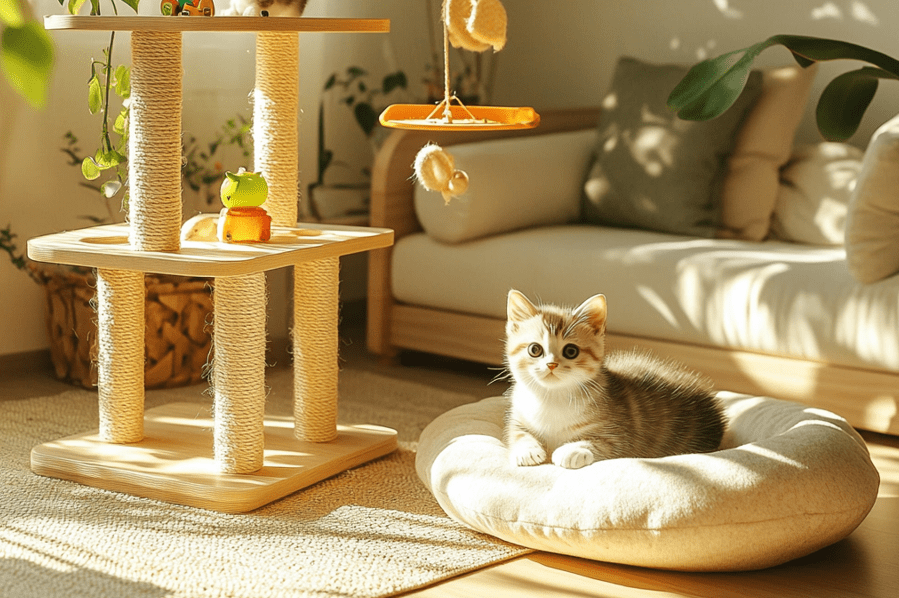
First Night Kitten New Home – What to Expect
The first night kitten new home experience can be unpredictable. Some kittens may explore, others might hide, and a few may cry throughout the night. These reactions are perfectly natural as your new kitten adjusts to unfamiliar surroundings. Keep lighting low and noise minimal to mimic nighttime conditions in a nurturing environment. Patience and routine help your kitten adapt faster. Remember, this transition is part of the bonding process, building trust that will last a lifetime.
If you just adopted or brought home your new kitten, one can naturally get very excited about the life ahead of them: companionship, years of good honest fur-filled memories. But the first night is often difficult. In just a short time, they may have experienced many things like being separated from their mother and littermates, adjusting to a new home, being exposed to strangers and possibly traveling long distances. This can all just feel too much, it might make for a terrible first night or two between you and your pet.
First thing to decide is where you are going to allow your kitten to sleep. And you will likely also want to prepare with necessary supplies for a pleasant environment. The good news is, there are some great ways to soothe your little furball, de-stress the environment and make for a better night’s sleep all round. Here is how you can ease that transition.
To watch the summary of this article, just watch this video-
How to Make Your Kitten’s First Night as Comfortable and Safe as Possible
The first night in a new home environment can be an overwhelming experience for her although bringing home a new kitten is a fun beginning. First, the new kitten needs a little room to adjust and start to get used to everything around her. So you need a small, secure room and make sure it is kitten-proofed where she can chill out. With a mild winter, you could also use a spare bedroom or even your mudroom as long as it is warm enough, quiet and cozy. It will reduce her stress as she can feel safe in this limited environment before venturing out into the real world.
If you want to keep her near during the night, you can use your bedroom as long as she is safe in a pen or crate that is big enough for her kitten size. This peace of mind can be really relieving in those first few hours since it enables you to keep an eye on her and provide comfort. No matter which room, ensure that the room is devoid of anything harmful to her such as houseplants, human food, electrical cords or other small objects she can chew on. For ultra-thoroughness you can even get down to her level and explore the room from her point of view to find other potential hazards that you may have missed.
A quiet, warm atmosphere is conducive to an easy transition. Your well done preparations will make your kitten more likely to settle in happily, which in turn will help her to feel at home.
First Night With a New Kitten – Preparing Emotionally and Practically
The first night with a new kitten isn’t just a challenge for the kitten — it’s a big emotional adjustment for you too. Preparing mentally and emotionally will help you provide calm, assertive energy that comforts your pet. Have everything ready: food, litter box, water, and a secure place to sleep. Avoid overstimulation with too much petting or handling. Like human babies, kittens need time, space, and gentle care to feel safe in new surroundings.
Top 6 tips to help your kitten feel at home
In addition to choosing the right bed for your kitten, there are a number of tricks to making an environment conducive to peace — and potentially stopping your cat from crying at night. Below are several tips that can help:
Where Should My Kitten Sleep the First Night?
Wondering where should my kitten sleep the first night? The ideal spot is a quiet, warm, and secure space — like a cozy corner of your bedroom or a soft crate. Avoid isolating your kitten in large, unfamiliar rooms. Sleeping near you (in a safe enclosure) helps reduce separation anxiety while still teaching them independence. Be sure the sleeping area is away from drafts and filled with comforting smells, like a shirt with your scent or a familiar toy.
Kitten First Night – Understanding Their Anxiety
During the kitten first night, anxiety is common due to separation from their litter and exposure to new stimuli. Signs include crying, hiding, or excessive grooming. To ease this, maintain a soft tone when speaking, offer a safe object like a plush toy, and stay close without overwhelming them. Introducing calming sounds like low-volume classical music or white noise can simulate the comforting hums of their past environment. Recognizing these behaviors is key to easing their stress.
Kitten First Night Home – Building Confidence
The kitten first night home is the first step in building lifelong confidence and trust. Let your kitten explore one room at a time and reward positive behavior with gentle encouragement. Avoid loud noises or sudden movements. Incorporating vertical spaces like shelves or cat trees early can foster curiosity and control over their environment. A confident kitten will grow into a relaxed, affectionate adult cat — and it all begins with this crucial first night.
Comfort Them with a Familiar Scented Blanket

If your kitten has come from a breeder, see if they will be able to give you a small piece of blanket that smells like the mother cat. Especially in the first few evenings, this well-known fragrance can give comfort and assurance. Kittens have a more sophisticated sense of smell than humans; even if you can’t perceive it, familiar odors help them transition. Or a calming diffuser will work too, which may reassure without making a scent so detectable to humans.
Keep a Comfortable Temperature
Kittens sleep more soundly in a comfortable temperature, just like humans do. Kittens around the age of 8 weeks are generally comfortable in a room at a temperature of about 72°F or warmer, especially when blankets or other options for warming them (like heating pads or hot water bottles) are available.
Use a Heartbeat Pillow

A pillow that recreates the mother cat’s heartbeat can bring comfort to a sense of companionship. There is a heartbeat device hidden within the pillow that vibrates in the same way as a heart, which can help ease anxiety and bring comfort.
Consider a Heated Bed
A heated cat bed can provide warmth comparable to body heat, making your kitten feel safe and comfortable again.
New Kitten First Night – Creating a Sensory-Friendly Zone
The new kitten first night can be more peaceful if you create a sensory-friendly environment. Reduce jarring visual stimuli with dim lights, and use tactile comfort like faux fur bedding. Kittens rely heavily on scent and sound, so diffusers with pheromones and rhythmic background noise can make all the difference. This sensory comfort not only improves sleep but fosters trust, accelerating your kitten’s emotional adaptation to its new surroundings.
Create a Private Hideaway

Kittens may feel a little vulnerable in new environments so having a small house or tunnel can provide them with a safe spot to hide. Give some privacy but also be able to watch them — make sure the area allows this.
Gently guide them to sleep in their own bed
As your kitten adjusts to her new home and gets to know where the litter box is, you may want to give her a spot of her own to sleep rather than allowing him or her to sleep in with you, as much as that may be appealing. Give it a few weeks, and you can always re-evaluate if necessary.

Kittens First Night in New Home – Managing Nighttime Crying
Kittens first night in new home often includes some heartbreaking meows. Don’t worry — this is a natural response to change. Instead of rushing to pick them up every time, try gently talking or placing your hand near them so they can smell your scent. Consistent routines help too. Feeding dinner a couple of hours before bedtime and engaging in light play can expend energy and promote deeper sleep. Gradually, the nighttime crying will lessen.
Becoming Friends on First Night to Ease Your Kitten Adoption into Her New Place
The first night or two with your new kitten will probably be a bit tough in the beginning, but so long as you have her living setup comfy, cozy, warm and safe she should mostly transition well and start getting to know her new family. If you take time to plan for her and make sure that she is okay, then the transition will be easier, making her feel safe and relaxed in this new place. A bed, a cuddle, some gentle words and patience will do the trick. Soon these initial nights will be happy memories as your kitty settles into a treasured family member.
Where Should Kittens Sleep at Night – Setting Long-Term Habits
It’s not just about the first night — where should kittens sleep at night is a question that sets the stage for lifelong habits. Whether you opt for a cat bed in your room or a dedicated space elsewhere, consistency is key. Avoid frequently changing sleep spots, as this disrupts their sense of territory. Reinforce nighttime as a restful period by keeping the house quiet and dark. Over time, your kitten will settle into a reliable bedtime routine.




